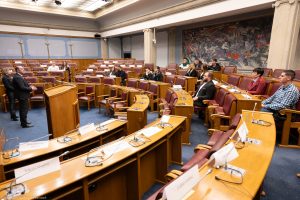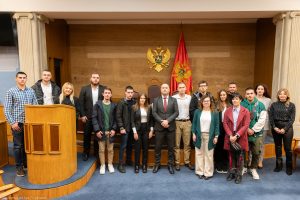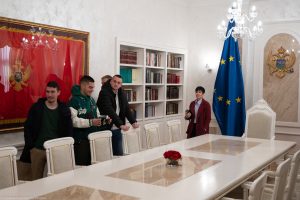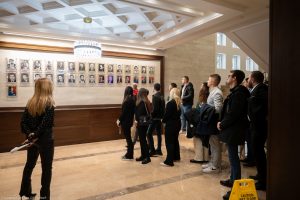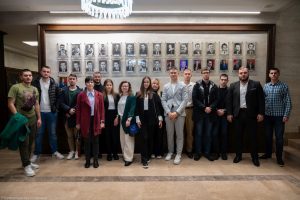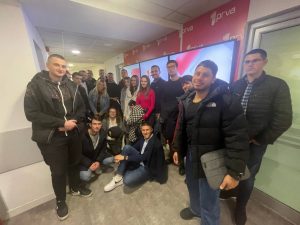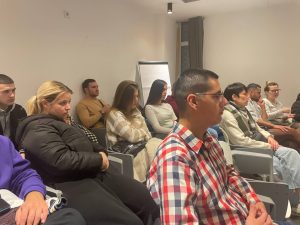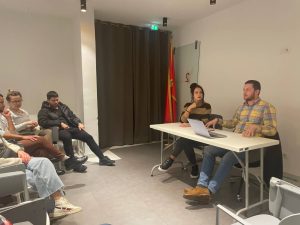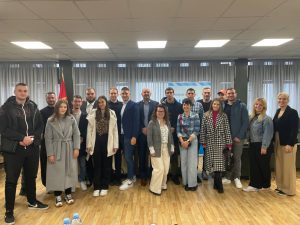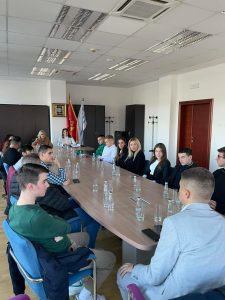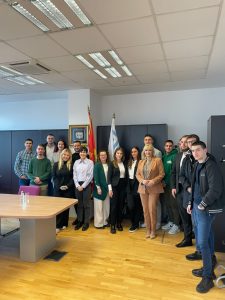As the two-year Erasmus+ project “Critical Thinking and Participation as a Foundation of Democracy in Europe” reached its evaluation phase, a significant meeting was held in Podgorica, Montenegro, from December 4th to 9th, 2023. This crucial gathering involved 20 participants, each representing their project partners, encompassing two project staff and three youth workers actively engaged in the project’s activities.
During this evaluation meeting, the participants embarked on a series of insightful visits to key Montenegrin institutions. These excursions provided a rare and valuable opportunity to delve into the intricacies of media literacy and democratic processes, guided by field experts. The visits afforded a comprehensive understanding of democracy’s multifaceted landscape and the essential role of media literacy. Engaging with key professionals, the participants gained invaluable insights into how different sectors contribute to developing a democratic society and the crucial role of media literacy.
The shared knowledge and experiences from these institutions deepened the participants’ understanding of the complex relationship between media, civil society, and governance in shaping a democratic landscape. Additionally, these visits added a significant layer of new insights to our activities’ evaluation, enhancing our understanding and shaping potential contributions to future projects.
The Visits and Insights...
At the Agencija za elektronske medije Crne Gore, participants were greeted by Elvira Ceković, Head of Public Relations and General Affairs, and Srorđe Vujnović, Advisor to the Director of International Relations. The focus of this visit was on the agency’s approach to media regulation, censorship, and content control. Discussions with Ceković and Vujnović offered nuanced insights into balancing media freedom with responsible reporting, particularly concerning broadcasters.
The visit to RTCG – Radio Television of Montenegro, led by Miomir Maroš, a renowned TV author, Doctor of Communication, and University Professor, highlighted the transition from traditional to digital media. Maroš facilitated a deep dive into the ethical considerations in journalism and the critical role of public broadcasting in a democratic society, which are crucial for understanding media literacy.
At Prva TV Crna Gora, Executive Director Ivan Vukčević provided an in-depth analysis of operations in a private media setting. The discussions, contrasting private media with public broadcasting, centered on content creation, audience engagement, and the balance between commercial interests and journalistic integrity.
Igor Milošević, the founder of ADP-Zid, showcased the NGO’s role in promoting democratic participation, especially in a non-EU context. He detailed the strategies for youth engagement and the complexities of participating in cross-border collaborations under the Erasmus program.
Participants also visited the Građanski pokret URA, where Ana Novaković decembraurović, the Movement Director, and Dritan Abazović, President of URA and former Prime Minister, provided insights into URA’s approach to incorporating youth into political processes. The discussion spanned topics from policy-making to active youth engagement in politics, highlighting the party’s role in the civil sector.
At the NVO Centar za omladinsku edukaciju (COE), Executive Director Yugoslav Radović highlighted the organization’s initiatives, particularly the EYCA and SIA programs. Radović detailed how these programs empower youth for democratic participation, enhancing youth mobility, education, and their ability to contribute to society.
The visit to Vlada Crne Gore featured interactions with Dragoslav Šćekić, Deputy Prime Minister for Demography and Youth, and former Minister of Sport and Youth. Šćekić provided insights into the government’s strategies for youth development and democratic participation, discussing the EYCA program’s implementation and its role in facilitating young people’s access to education and networking at national and European levels.
The Montenegrin Assembly visit, featuring insights from Velimir Djoković, Chief of the Cabinet of the Speaker, and Sanja Perić, Public Relations Official, was a deep dive into the legislative processes and the role of parliament in a democratic society. This visit emphasized the Assembly’s role in the democratic process, the importance of transparency in legislation, and public participation in shaping democracy.
The visit to the Municipal Assembly of Podgorica, hosted by Dr. Jelena Borovinic Bojovic, President of the Municipal Assembly, proved to be an inspiring experience. Dr. Bojovic’s journey into politics served not only as a testament to her personal achievements but also as a crucial learning point about the role of women in democratic processes. The discussions, led by Dr. Bojovic, centered on how women can significantly influence decision-making and, most importantly, find their voices in a system that often holds entrenched views about women and society.
During the visit, Dr. Bojovic also elaborated on the role of the Municipal Assembly in shaping democratic processes. She emphasized the importance of young people’s participation in creating a brighter and more inclusive future for Podgorica. This visit highlighted the critical impact of female leadership in political institutions and the need for greater youth engagement in the democratic journey of the city.
In conclusion, the evaluation meeting and the institutional visits in Montenegro were not only a culmination of the Erasmus+ project’s activities but also a springboard for future initiatives. They highlighted the critical role of education, dialogue, and active participation in strengthening democratic processes. The experiences and knowledge gained have laid a solid foundation for continued engagement and contribution to the development of democratic societies.
The project is Co-funded by the European Union.

